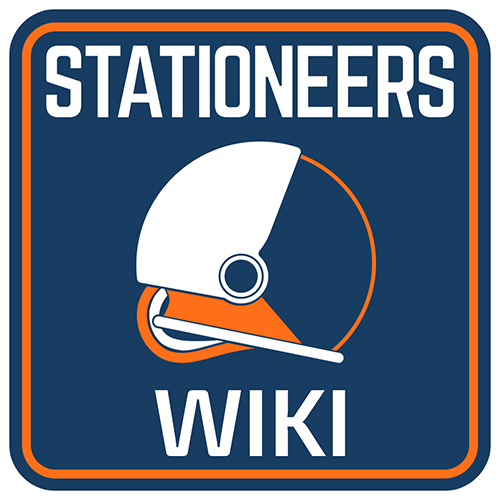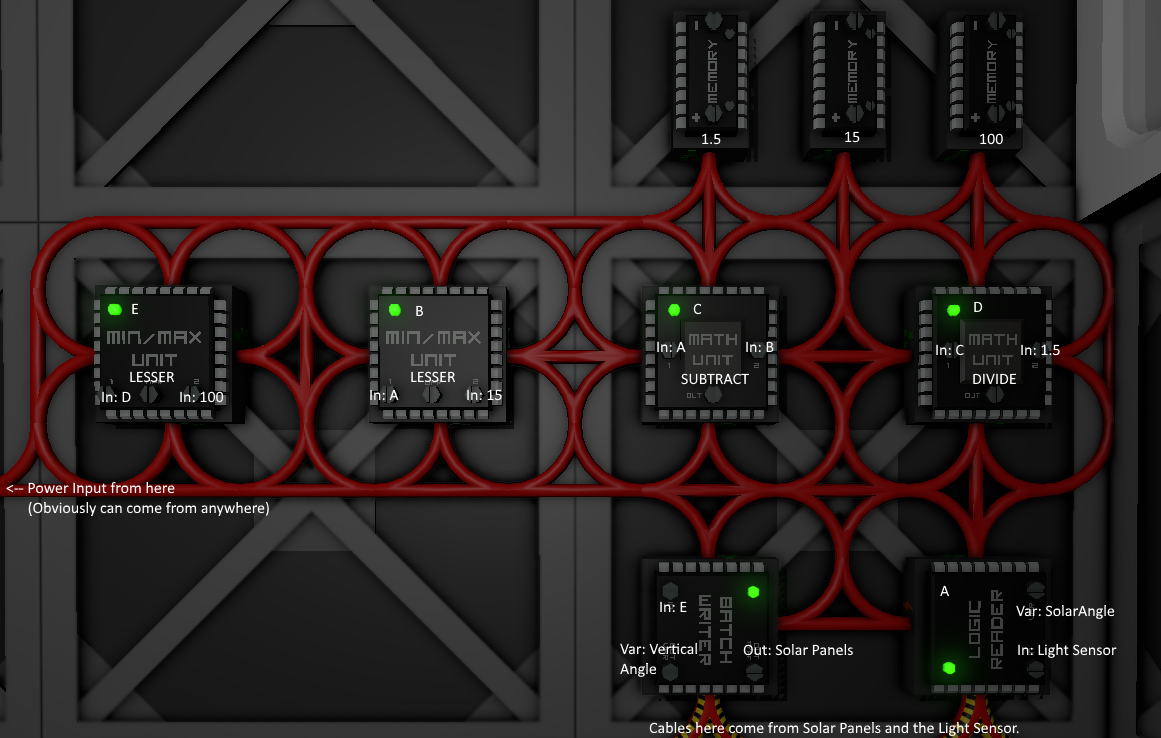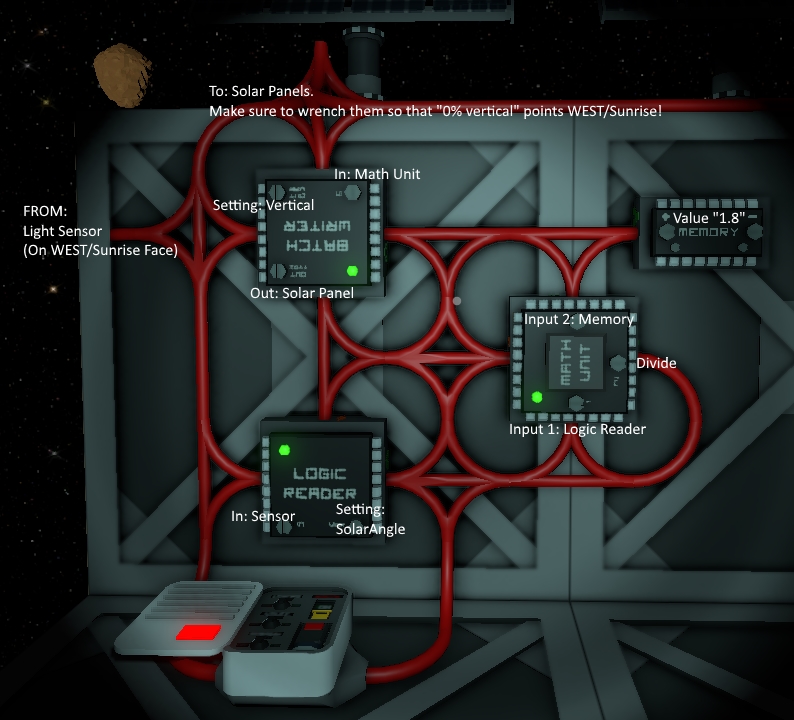Solar Logic Circuits Guide
From Unofficial Stationeers Wiki
Contents
Disclaimer
Due to the frequency of game updates, all solutions are subject to change and may or may not be functional.
Accurate Solar Setup
Authors: Wooodiii, Corvus_bkgk, Enfantcool, Baksch
Properties: Accurate (average error 1.3°), Auto-reset (variant), Power conserving (variant)
Number of Components: 10-12
This setup is accurate, giving 495-500W throughout the day, with lower output only when the sun is lower than the panels can physically aim at.
This setup adjusts for the fact that solar panels rotate through only 150 degrees. Instead of converting using 180/100, this setup converts by doing 150/100. It then clips the value at the edges, where the prior calculation would give elevations that are negative or greater than 100 (representing the fact that we would prefer the panel to track past 0 or 100, aiming all the way down to the horizon instead of stopping 15° short). The listed average error is nonzero only because of this completely unavoidable portion; the error is 0 throughout the 15°-165° portion of the day.
Design
- 1 Construction Kit (Sensors) ("Daylight Sensor")
- 2 Kit (Logic I/O) (1 "Logic Reader", 1 "Batch Writer")
- 3 Kit (Logic Memory)
- 4 Kit (Logic Processor) (2 "Math Unit", 2 "Min/Max Unit")
- The Daylight Sensor should face the sunrise.
- Solar panels should be rotated such that 0% vertical faces the sunrise.
| Component (Name) | Settings | Explanation |
|---|---|---|
| Logic Reader (A) | Daylight sensor, Solar angle | Sun's angle above the horizon |
| Memory (15) | 15 | True angle of solar panels at 0 elevation |
| Memory (1.5) | 1.5 | 150/100, the conversion constant from solar angle (range:15-165, i.e. 150) to panel elevation (range:0-100) |
| Min/Max Unit (B) | max(A,15) | Adjustment amount: 15, unless that would take A-B negative, in which case only enough to reach 0 (low edge case). Equivalent to min(A-B,0) but doesn't require storing 0. |
| Math Unit (C) | A-B | Adjusted solar angle |
| Math Unit (D) | C/1.5 | Conversion from solar angle to panel elevation |
| Memory (100) | 100 | Maximum possible panel elevation |
| Min/Max Unit (E) | min(D,100) | Cap elevation to 100 for solar angles past 165° (high edge case). Equivalent to doing min(A-B,165) before step D, but 100 is easier to set in memory than 165. |
| Batch Writer | E -> Solar panels, Vertical angle | Send elevation to solar panels |
Auto-Reset Variant
For panels that automatically reset their facing upon sunset, use two more components, and adjust the final min/max unit:
| Component (Name) | Settings | Explanation |
|---|---|---|
| Logic Reader (L) | Daylight sensor, Activation | 1 while daytime, 0 while nighttime |
| Math Unit (F) | 100*L | Maximum panel elevation, now 100 during day and 0 at night |
| (from above) Min/Max Unit (E) | min(D,F) | Adjusted panel elevation (high edge adjustment) |
Power-Conserving Variant
To conserve power, it's possible to avoid running the entire circuit at night. A transformer can be controlled to power the main logic network above. In this way, only the two new components need to remain powered at all times.
| Component (Name) | Settings | Explanation |
|---|---|---|
| Logic Reader (L) | Daylight sensor, Activation | As in the auto-reset variant above |
| Logic Writer | L -> Transformer, On | Transformer powers main logic network |
Easy/Compact Solar Setup
Author: Evie
Stationeers Version: 0.1.1068.5451
Properties: Simple, Inaccurate (Average error: 7.5°)
Number of Components: 5
This imperfect setup is a common starting point. It starts off at 375w of power in the morning, builds up to 500w at zenith (noon) then back to 375. This is due to the fact that solars rotate through only 150 degrees of elevation and that this setup's math is correct only if they rotated through all 180 degrees of solar angle.
Design
- 1 Construction Kit (Sensors)
- 2 Kit (Logic I/O)
- 1 Kit (Logic Memory)
- 1 Kit (Logic Processor) ("Math Unit")
Notes
- The Daylight Sensor MUST be facing West (sunrise), but its rotation doesn't matter.
- Solar panels should be rotated such as that 0% VERTICAL rotation faces west/sunrise, and 100% VERTICAL faces east/sunset.
- The Area Power Control is necessary for the circuit to stay powered during the night. It also hides all the modules from the rest of your system.
- Importantly, the solar input power doesn't directly connect to any of the logic writers. This not only ensures your system doesn't lose power but also prevents short-circuiting that would burn cables.
- Using 1.7 instead of 1.8 reduces the average error of this design to 6.5° and increases overall power generation, particularly in the afternoon.


